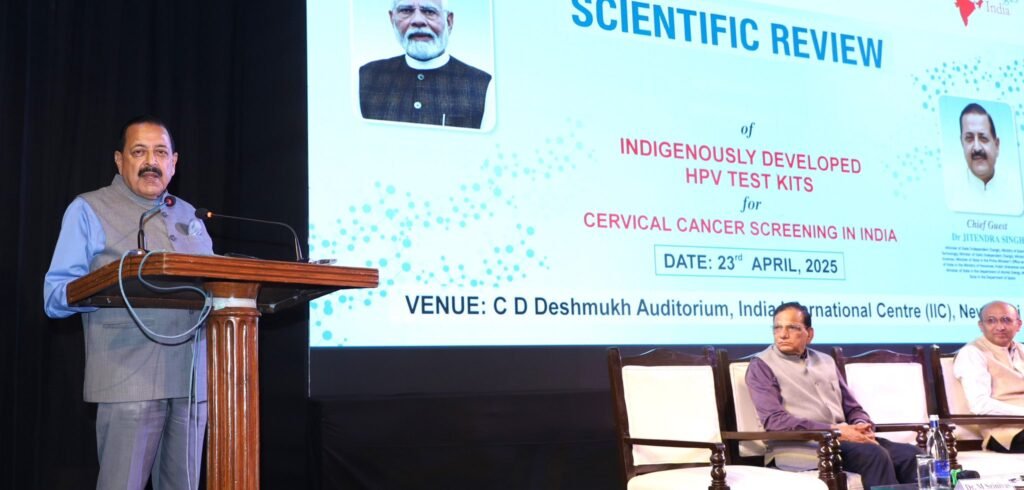New Delhi, April 24, 2025: Union Minister of State for Science and Technology, Dr. Jitendra Singh, chaired a high-level joint meeting on April 23, 2025, to review the development of indigenously manufactured Human Papillomavirus test kits for cervical cancer screening. The meeting, attended by representatives from NITI Aayog, the Department of Biotechnology , All India Institute of Medical Sciences New Delhi, Biotechnology Industry Research Assistance Council , Indian Council of Medical Research , and industry partners, marked a significant milestone in India’s fight against cervical cancer. The initiative, led by DBT under the Ministry of Science and Technology, aims to position India as a global leader in preventive healthcare.
Dr. Singh highlighted the alarming statistic that one in five women globally suffering from cervical cancer is from India, with the country accounting for 25% of global cervical cancer deaths, often due to late diagnosis. The newly developed HPV test kits, validated through the DBT-BIRAC Grand Challenges India program, are rapid, point-of-care, RT-PCR-based diagnostic tools tested at premier R&D laboratories across India. These kits target the seven to eight most common cancer-causing HPV types, offering a cost-effective and efficient screening solution compared to existing methods like Visual Inspection with Acetic Acid , Pap smears, and HPV DNA testing, which are resource-intensive and moderately sensitive.
The Minister emphasized the critical role of private sector collaboration, describing the achievement as a result of a “whole of science, whole of government, and whole of nation approach.” This public-private partnership (PPP) model, extended to international collaborations, has been pivotal in advancing India’s healthcare innovations, including the development of the country’s first DNA vaccine. The meeting also acknowledged the contributions of key figures, including Dr. V.K. Paul (NITI Aayog), Dr. Rajesh Gokhale (Secretary, DBT), Jitendra Kumar (Managing Director, BIRAC), and Padma Shri Dr. Neerja Bhatla, a leading expert in gynecologic oncology.
The indigenous HPV test kits are expected to significantly reduce screening costs and improve accessibility, particularly in low- and middle-income areas, aligning with the World Health Organisation’s 2030 target to eliminate cervical cancer. The initiative also addresses India’s broader health challenges, with Dr. Singh noting the rising burden of non-communicable diseases like early-onset Type 2 diabetes among the country’s youth, who constitute over 70% of the population under 40.
The review meeting, held at Max Mueller Marg, New Delhi, began with a two-minute silence to honour victims of the recent Pahalgam terror attack, reflecting the administration’s solidarity with affected families. This development follows other DBT-BIRAC achievements, such as the antibiotic Nafithromycin and lentiviral-based gene therapy trials for hemophilia, underscoring India’s growing prowess in medical innovation.



